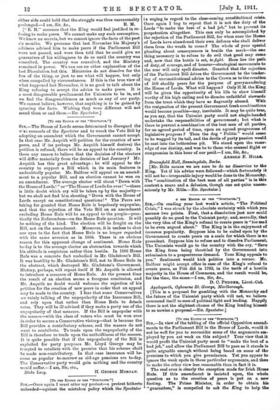[To THE EDITOR OP' THE "SrECTATOR."1
SIR,—The House of Lords seems determined to disregard the w's1 counsels of the Spectator and to wreck the Veto Bill by adopting an amendent which the Government cannot accept. In that case Mr. Asquith will petition for the creation of new peers, and if (as perhaps Mr. Asquith himself desires) the petition is refused, there will be an appeal to the country. Is there any reason to believe that the decision of the electors will differ materially from the decision of last January ? Mr. Asquith has this great advantage : he will appeal to the country to support a Bill which in its main features is undoubtedly popular. Mr. Balfour will appeal on an amend- ment to a popular Bill, and an election cannot be won on an amendment. The average elector will shout " Down with the House of Lords ! " or " The House of Lords for ever! "—there is little doubt which cry will be taken up by the majority— but we shall not find him shouting " Down with the House of Lords except on constitutional questions!" The Peers are taking for granted that Home Rule is hopelessly unpopular, and that the rejection of the -Veto Bill on an amendment excluding Home Rule will be an appeal to the people—prac- tically the Referendum—on the Home Rule question. It will he nothing of the kind. The election will be fought on the Bill, not on the amendment. Moreover, it is useless to shut our eyes to the fact that Home Rule is no longer regarded with the same aversion as in 1886. There is an obvious reason for this apparent change of sentiment. Home Rule to-day is to the average elector an abstraction towards which his attitude is suspicious rather than hostile. In 1886 Home Rule was a concrete fact embodied in Mr. Gladstone's Bill. It was hostility to Mr. Gladstone's Bill, not to Home Rule in the abstract, which destroyed Mr. Gladstone's Government. History, perhaps, will repeat itself if Mr. Asquith is allowed to introduce a measure of Home Rule. At the present time the result of an election seems a foregone conclusion, and Mr. Asquith no doubt would welcome the rejection of his petition for the creation of new peers in order that an appeal may be made to the country. I fear that some Conservatives ire vainly talking of the unpopularity of the Insurance Bill, and rely upon that rather than Home Rule to detach votes. They will be ill-advised if they make a party use of the unpopularity of that measure. If the Bill is unpopular with the masses—with the class of voters who must be won over in order to secure a Conservative victory—that is because the Bill provides a contributory scheme, and the masses do not w ant to contribnte. To trade upon the unpopularity of the Bill is therefore to trade upon the tinthriftiness of the masses. It is quite possible that if the unpopularity of the Bill is exploited for party purposes Mr. Lloyd George may be tempted to retaliate with the promise that his scheme shall be made non-contributory. In that case insurance will be- come as popular to-morrow as old-age pensions are to-day. The Conservative party would gain nothing and the country would suffer.—I am, Sir, etc.,














































 Previous page
Previous page